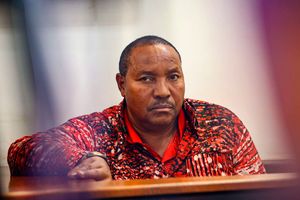Premium
Sun, sand and social distancing as Coast beaches reopen

Staff celebrate after re-opening of the PrideInn Paradise Beach Hotel in Shanzu, Mombasa.
What you need to know:
- At Taita Hills and Salt Lick Safaris Lodge, a guest relations officer walks around reminding tourists to wear their face masks.
- At the swimming pool, social distancing is paramount.
- In most hotels, swimming pools are treated daily to ensure chlorine does not fall below the recommended level.
- Kenya heavily depends on the hospitality industry for foreign exchange.
The Covid-19 pandemic and the attendant rules to curb its spread have affected many economic sectors. One of the hardest hit has been the travel and tourism industry, especially following the suspension of international travel.
There remained only a few options for players in the industry, and closing down was not one of them. Like any other sector, losses had to be avoided at all costs. There is now a new normal and all have to live by it.
As you enter the dining area of PrideInn Paradise Beach Resort and Spa in Shanzu, you will notice the reconfiguration of the area that has ensured proper social distancing. You will quickly notice personal protective equipment-clad employees serving guests sitting two metres apart, while others are spread by the pool.
At noon, you will meet Mr Gurpreet Singh Mehta, the director of food and beverage and culinary operations at the dining area, busy giving instructions to his staff, just before lunch.
Adapted to new norm
“We have adapted to the new norm, which includes wearing PPE and ensuring social distancing. No lining up to take meals; you come to the dining area, wash your hands and sit on the table. The chefs serve you, so that there’s no contamination,” says Mr Mehta.
Some hotels have even done away with the buffet, preferring à la carte to minimise contact. As for swimming, only residential guests are allowed in the pool.
“Face masks, shields, staff safety are paramount. Gloves are changed every 15 minutes due to humidity. The new norm entails a lot of work; the kitchen has completely changed as we also ensure chefs keep a one-metre distance. At the dining area, the tables are set 1.5 metres apart and are regularly sanitised. For alcohol, we serve only residential guests,” he offers.
At Taita Hills and Salt Lick Safaris Lodge, the most outstanding feature is a guest relations officer who walks around reminding tourists to wear their face masks.
“We are always busy during weekends, so when the restaurant is full, dinner is served in two sittings, at 7.30pm and 8.30pm. We do not want congestion,” says Mr Willie Mwadilo, the general manager.
Located at the heart of the Taita Hill Sanctuary bordering Tsavo West National Park, the hotel has also embraced plate service.
No crowding
“The main meals are served by staff to ensure no crowding. We ensure people come in small numbers to minimise contact,” adds Mr Mwadilo, who is also the chairman, Kenya Association of Hotel Keepers and Caterers’ Tsavo West, Tsavo East and Amboseli national parks.
At the swimming pool, social distancing is paramount. The Kenya Coast Working Group chairman, Mr Husnain Noorani, says all hotels have put in place measures that guarantee safety of their guests.
In most hotels, swimming pools are treated daily to ensure chlorine does not fall below the recommended level. For conferencing, only a maximum of 100 guests are allowed.
“We check our guests’ temperatures and encourage them to wear face masks at all times,” offers Mr Noorani.
At Bahari Gates Garden in Kilifi County, things are no different.
“We have hand-washing points strategically located throughout the facility. We sanitise all tables and chairs before and after use,” says Mr Samuel Kisandu, the general manager.
At Sunset Paradise Holiday Homes, it’s a similar script. “We fumigate rooms regularly. No more buffet to minimise contact. Only residential guests are served at the bar,” says Ms Anne Nyaga, the marketing manager.
Tourism is a delicate industry that can easily be brought to its knees by any form of violence or risk. In the past five months, more than two million Kenyans lost their jobs due to the pandemic.
“The tourism sector has been hit hard and we need to push hard and invest more. Our facilities have been in a deplorable state,” says Tourism and Wildlife Cabinet Secretary Najib Balala.
Kenya heavily depends on the hospitality industry for foreign exchange and is the third largest travel and tourism economy on the continent after South Africa and Nigeria. Last year, the country welcomed more than two million international visitors.





